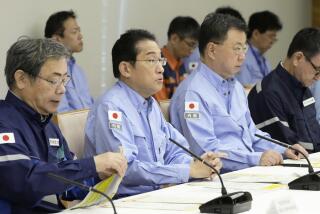Japan Ventures Out
- Share via
Trucks roam Tokyo daily with loudspeakers blaring the need for Japan to rearm, even to develop nuclear weapons. The extremists’ message sends shudders through the victims of Japan’s World War II depredations and has made it too easy for the nation to duck the greater role it should play in world affairs. But the recent Japanese Parliament vote to send up to 1,000 troops to Iraq signals a welcome, though belated, willingness to stick the nation’s neck out farther; it also keeps Tokyo firmly among America’s friends.
Japan’s shattering World War II defeat, capped by the devastating nuclear bombings of Hiroshima and Nagasaki, led to deep mistrust of the armed forces that had plunged the nation into war. The “peace constitution,” drafted by Gen. Douglas MacArthur’s U.S. occupation forces, renounced war and enhanced Japan’s pacifistic tendencies. So did Asian neighbors like China and South Korea, which suffered the brutality of Japanese troops and colonizers and have been quick to sound alarms over any perceived Japanese “remilitarization.”
But Japan has been a democracy for more than half a century and has transformed itself into the world’s No. 2 economy. Matching its economic clout with help for other nations, including peacekeeping missions, is long overdue. Japan picked up much of the bill for the 1991 Persian Gulf War, but its refusal to send troops caused many to deride it as a mere ATM country. In 1992, Tokyo did supply peacekeepers for Cambodia and later for East Timor, cautious steps to greater engagement outside its borders and done under United Nations aegis. Two months after 9/11, Japan sent a destroyer, minesweeper and supply ship to the Indian Ocean to support the U.S. war on terror.
Those actions caused controversy at home, as did Parliament’s July 26 Iraq vote. That contrasts sharply with Germany, the other major power defeated in World War II, which today has peacekeepers in Afghanistan and three weeks ago even sent a general to Paris to lead the Bastille Day parade. Germany has spent decades wrestling with its war history, especially the Holocaust. Japan has spent decades avoiding its responsibility for war. That evasion has given ammunition to its Asian foes and deprived the postwar generation of vital knowledge.
Each decade sees more Japanese demanding shifts in the nation’s constitution, allowing a greater military role -- as befits a “normal country.” North Korea’s firing of a missile over Japanese territory, its admitted kidnappings of Japanese citizens and its nuclear buildup worry Tokyo, with reason.
Japan’s actually getting its peacekeepers to Iraq will be the greatest test thus far of its willingness to send troops into combat conditions. Prime Minister Junichiro Koizumi backed the U.S. invasion of Iraq and wants a more global role for peacekeepers. He must persuade his skeptical countrymen to support this mission, realizing the possibility of casualties. It is in Japan’s interest to use armed forces to help maintain stability outside its borders. This is not the country of half a century ago; though it should not forget the carnage it inflicted, it also should not be paralyzed by the memory.
More to Read
Sign up for Essential California
The most important California stories and recommendations in your inbox every morning.
You may occasionally receive promotional content from the Los Angeles Times.













